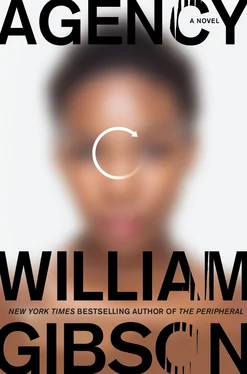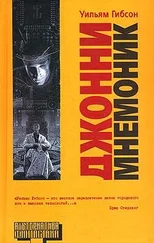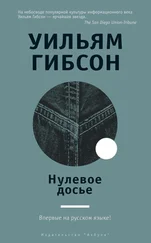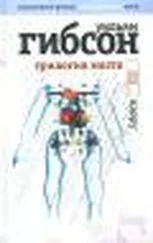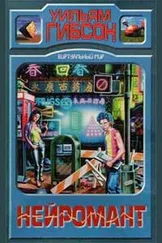“It’s invisible.”
“Right.”
“I know. But from up there, it looked like the future. Big towers, the size of the Shard, set out in a grid, either side of the Thames.”
“CG,” he said, “or maybe that helmet you’re wearing, doing something directly to your head? We’ve never been pitched time travel before, though. Free energy, a couple of times, but that’s a genre unto itself.”
“They tell me it’s more like alternate time-tracks. Get this off.” Indicating the helmet. He did. She got to her feet, stretching her arms above her head, and bent to touch her toes.
“We were talking,” a man’s voice said, “then you were gone. Conner, remember?”
Verity straightened, blinking, and looked at the drone, which she saw had rotated to face her. “Why were you up against the curtains, that way?”
“Watching the traffic,” the man said, from the drone’s speaker. “It’s all vintage.”
“Where are you?”
“The White House. Basement of the West Wing.”
“Why?”
“Different stub. A ways up the line from you, except there’s no line. Headed in a different direction, from them and from you.”
“Your name’s Conner?”
“Conner Penske,” he said.
“Drones that people pitched Stets,” she said, “ones that looked anything like that one, made a lot more noise.”
“We upgraded. Had the people who fabbed it use the most bleeding-edge components they could find.”
“I’m so tired I can barely stand up,” she said.
“Bed,” Virgil said, pointing to the other room. “In there. Sleep. That’s the plan. Conner and I’ll be out here.”
“And charging this unit, while we’re at it,” Conner said. “That’s one thing Ash couldn’t get upgraded to anywhere near our standards. Batteries.”
“Good night,” said Verity, reflexively, already headed for the door to the adjoining room.
The peripheral was watching Netherton from the couch, in that curiously nonintrusive way that meant it was once again under the control of its manufacturer’s AI.
“I like her,” said Rainey, Thomas on her hip. Netherton assumed she meant Verity. She didn’t always like clients, though in that case she wouldn’t mention it.
A sigil appeared, pulsing, unfamiliar at first. Then he recognized it as Lev Zubov’s, featuring the faces of his two pet thylacines. “Phone,” he said to Rainey, “sorry.” She nodded, turning back to Thomas in his high chair at the table. “Lev,” he said, “how are you?”
“Reasonably well,” said Lev, not sounding it. He’d been unhappy with the divorce, Netherton knew, which had been his wife Dominika’s idea, and with its outcome, which had seen her remain in the house in Notting Hill, along with their child. He’d since taken up residence in another Zubov family property, in Cheyne Walk, which Netherton hadn’t yet seen, reportedly even more redolent of old klept than the Notting Hill place. He doubted Lev was happy with that either, he and his cohort preferring to treat their klepthood as something of a joke, not that anyone else could afford to.
“I need to see you,” Lev said, sounding no happier about that. “Tonight?”
Urgency wasn’t something Netherton associated with Lev, but this was sounding like a sadder man than he’d known before, and he felt a pang of guilt for not having kept in touch recently. Lev had been instrumental in helping Netherton finally address his problem with drink, without which there might now be no Rainey in his life, nor any Thomas.
Lowbeer’s sigil pulsed urgently.
“Excuse me,” he said to Lev, “just a moment.” Muted him. “Yes?”
“See him tonight,” said Lowbeer. Her sigil vanished.
“Sorry,” he said, unmuting Lev. “Where shall we meet?”
“Not there,” said Lev, “this requires privacy.”
Not Cheyne Walk either, thought Netherton, then remembered the Denisovan Embassy. “One from your list of the interrupted, then? Under Hanway Street? Twenty minutes?”
“On my way,” said Lev, his thylacines vanishing.
“What’s that?” asked Rainey.
“Lev.”
“I gathered. What about?”
“Needs to get something off his chest, apparently. Lowbeer interrupted to say I should meet him. Hanway Street.” He removed the controller and placed it on the couch. “Don’t sit on this.”
“What’s there?”
“The Denisovan Embassy.”
“The sex club?” Up went the eyebrow.
“Formerly, yes,” he said. “I’m surprised you know of it.”
“I’d a client whose career crisis was brought on by a single particularly ill-starred visit there.” She regarded him narrowly. “A Canadian abroad.”
“It’s only round-the-clock breakfasts now,” he said. “I suggested it because it’s close, and on a list of his.”
“What list?”
“Of places that were one thing, but are now another, yet still have the same distinctive name. Fancies himself artistic, that way. If you need me, phone. I’ll try not to be long. Hope I won’t be.” He kissed her cheek.
He went into the bedroom for his jacket, put it on, setting it to medium warmth. By the time he’d stepped out into the mews, it felt exactly right. As he approached where he judged Lowbeer’s cloaked car to be, he hoped she wouldn’t stop him for a chat. It decloaked, but only partially, when he was three meters away, faintly revealing its outline in ghostly, washed-out pixels. He walked between it and the wall, not slowing, his eyes on what little was visible of Tottenham Court Road.
Ash’s sigil pulsed when he was nearing Hanway Place, the walk having been uneventful.
“Yes?”
“Rainey says you’re out.”
“Meeting Lev,” he said. “Where we were earlier.” She’d been Lev’s employee, his resident technician, when Netherton had first met her. “Have you seen him since the divorce?” he asked.
“Not since I left to work with Lowbeer.”
He was passing the shop where he’d gotten Thomas’s milk. He glimpsed the natty figure of the bot salesclerk. Michael something, he thought, certain that was the given name of the twentieth-century actor he thought it resembled. Surname still escaping him. “How are we doing, then, generally?” he asked Ash.
“Doing?”
“With our attempted rescue, or perhaps I should say takeover, of Verity’s stub.”
“They needn’t be mutually exclusive categories, as you know. The aunties’ odds are still for imminent use of nuclear weapons. Verity’s agreed to work with us, hopefully giving us all the entrée we need to Eunice’s network.”
He turned into Hanway Street. “I’m here,” he said, spotting the narrow, stalactite-festooned façade. “Give Lev your best, then?”
“Do, please,” she said, surprising him. “Far from the worst employer I’ve had.”
“I will, then.”
Her sigil faded.
As Netherton descended the spiral stone staircase, Lev’s sigil reappeared, thylacines pulsing. “Just arriving,” Netherton said.
“They’ll bring you to me,” said Lev, the sigil dimming but not disappearing.
“You’re Wilf?” asked the freckle-dusted redhead at the foot of the stairs, draped in a floor-length gossamer cloak, spangled with sequins reflecting mobile light-sources that clearly weren’t present.
“I am,” he said.
“Follow me, please.”
He did, noting late evening’s breakfasters seemed little different from the afternoon’s. More tipsy, perhaps, but that evident mainly in an increased decibel count. The girl’s cloak reminded him of a Japanese film Lowbeer was fond of, Mothra , which she sometimes screened in her car. He’d assumed it was silent, but Ash insisted that it had originally had a soundtrack, Lowbeer preferring it without. Now a similarly draped young woman joined them, identically redheaded and, Netherton immediately suspected, identically freckled, down to the very last spot. Then another, equally indistinguishable, confirming his suspicion that they were bots. All in restlessly luminescent cloaks, accompanying him back into those darker, red-lit reaches, beyond the breakfasters. When they reached Lev, finally, there were half a dozen red-haired girls, seemingly identical.
Читать дальше
